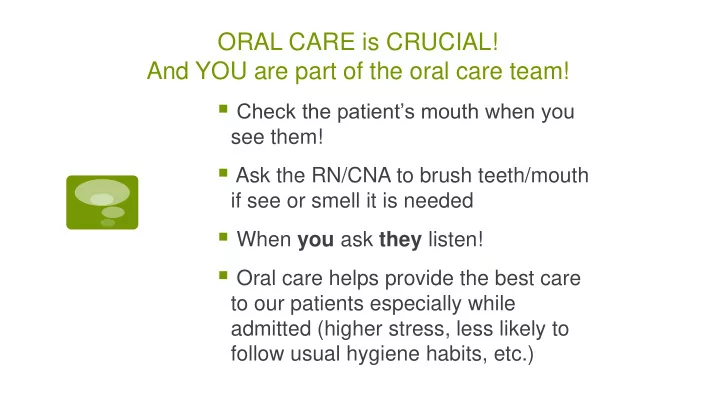

ORAL CARE is CRUCIAL! And YOU are part of the oral care team! Check the patient’s mouth when you see them! Ask the RN/CNA to brush teeth/mouth if see or smell it is needed When you ask they listen! Oral care helps provide the best care to our patients especially while admitted (higher stress, less likely to follow usual hygiene habits, etc.)
Who cares about oral care? Scrape a cubic millimeter of your teeth in the morning and you would collect up to 10 billion microorganisms Typical person’s oral microbiome maintains homeostasis facilitated by SALIVA Saliva is important for protecting and repairing oral mucosa, warding off viral, bacterial, and fungal colonization, digestion, taste, lubrication, cleansing, fostering a healthy microbial community, decay prevention, & dental prevention. Poor oral hygiene will cause dental plaque to form a dense bacterial biofilm that becomes too dense for the saliva to penetrate causing lower salivary pH. 1.5 hour of stress can alter saliva chemistry Given the high levels of stress and pathogens in critical care, vigilant oral care is essential Citation: Sheffler,K. The Toothbrush Defense. The ASHA Leader, May 2018.
The best predictors of aspiration pneumonia are: Inability to self-feed/ dependent for feeding Dependent for oral care Number of decayed teeth Tube feeding More than one medical diagnosis Number of medications Smoking ** Dysphagia was concluded to be an important risk for aspiration pneumonia, but generally not sufficient to cause pneumonia unless other risk factors are present as well . Langmore et. al (1998)
The type of oral care matters Use a toothette is NOT the same as using a toothbrush Brushing and rinsing stimulate salivary flow and remove harmful bacteria Brushing = improved quality of saliva and balance in oral cavity Biofilm can coat the teeth, tongue, and palates – risk is the same whether have dentition, dentures, or edentulous Foam swabs/toothettes are NOT successful in removing plaques and biofilm that harbor pathogenic microorganisms The teeth, tongue, and palate need to be well cleaned and brushed. Using a foam swab/ toothette is not enough. A nurse training program on the benefits of toothbrushing over foam swabs resulted in a 50% reduction in vent-acquired PNA(Ross & Crumpler, 2005). Ideally would brush and rinse Citation: Sheffler,K. The Toothbrush Defense. The ASHA Leader, May 2018.
A bit more proof Yoneyama (2002) found that 6% of participants with good oral care passed away whereas 20% without an oral care protocol passed away. Additionally, 9% of participants were diagnosed with PNA with good oral care v. 21% without an oral care protocol. For tube fed patients, Maeda & Akagi (2014) found that standard oral care given 2x/day resulted in a 40% decrease in hospitalizations. And PNA was twice as high in the group that had no oral care protocol as compared to those getting oral care.
Recommend
More recommend